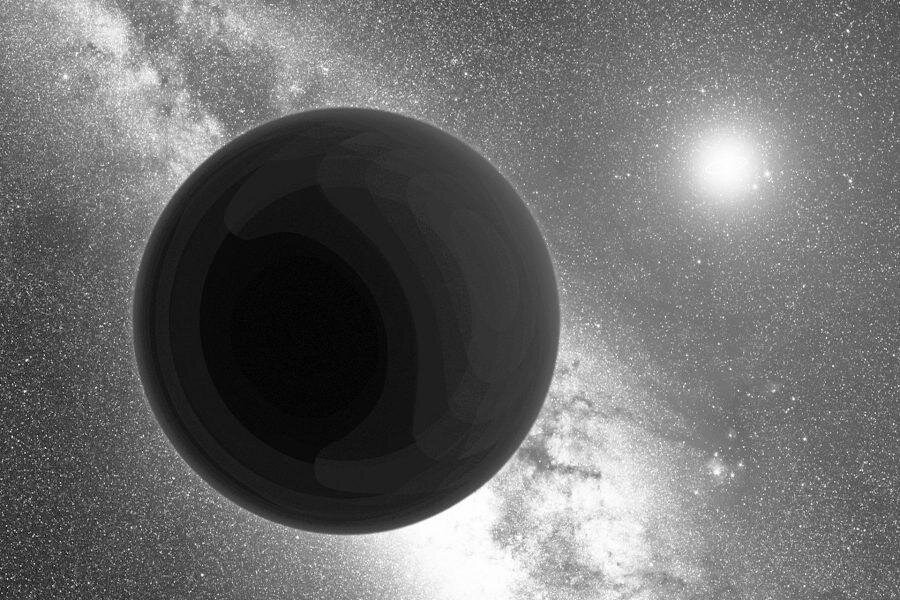Melina Monlux, News Editor
Originally published March 17, 2017
Artist’s representation of planet nine, an “ice giant” looming on the edge of the solar system, looking on a depiction of Neptune’s orbit around the sun. Photo courtesy of creative commons.
A landmark scientific discovery has been made recently. But it isn’t complete yet. Scientists believe that a new planet, currently dubbed “Planet Nine” exists unseen in the outer reaches of our solar system.
While the planet has yet to be seen, the very knowledge of its presence has sent the astronomical community into a flurry of excitement. A new planet has not been discovered in our system since 1846, with the discovery of Neptune (discounting, of course, the discovery of Pluto, which no longer holds planetary status).
Scientists first introduced the idea of Planet Nine’s existence in 2014 when astronomers Scott Sheppard and Chadwick Trujillo arrived at the theory after monitoring the orbitals of dwarf planets in the Kuiper belt. Sheppard and Trujillo observed that these bodies all had unusual orbital characteristics. This strange pattern led the astronomers to conclude that there was something influencing these orbitals. Something like a large, undiscovered planet.
Evidence in favor of Planet Nine was increased greatly earlier this year when astronomist Mike Brown found additional objects being influenced in a similar fashion. Astronomers have now observed eight celestial bodies with orbitals being rotated six degrees to the sun.
With all these clues in place, the scientific community has accepted Planet Nine and began their hunt among the stars.
They know number nine is out there, now it’s just a matter of finding it.
This task, however, is more difficult than it may sound. According to Space.com, the undiscovered new planet is large—predicted to be between 10 and 15 times more massive than earth—but it is in no way easy to spot. It resides approximately 200 AU (astronomical units) from the sun at its closest point in orbit. By comparison, the earth is only 1 AU from the sun, about 92.96 million miles. At its furthest point from the sun—what is known as the planet’s aphelion—the distance is circa 1,000 AU. Pluto, everyone’s favorite dwarf planet, only reaches a distance of 49.3 AU at its aphelion. This extreme distance is part of what makes the planet so elusive.
The other factor is its orbit. According to the New Yorker, it follows an eccentric pattern, meaning the orbit is more “elliptical than circular.” A side effect of this shape is that the planet spends the majority of its predicted twelve-twenty thousand year orbit around the sun at aphelion. As a result, astronomers have a large patch of sky to sweep, and a distant patch at that.
Nonetheless, the scientific community is optimistic about the search and expect the new planet to be found within the next 13 months. There are ten official groups currently on the search, using high powered equipment, including the famous Subaru telescope on Mauna Kea, Hawaii.
But astronomers care less about who gets credited by history with the discovery and more about the discovery itself. Thus, they have published all known information in regards to its possible whereabouts on the site “findplanetnine.com,” which concludes with the directive: “now go find Planet Nine.”
In anticipation, many names have been proposed by both professional astronomers and star fanatics alike. Brown refers to the planet as Jehoshaphat, while others have suggested Prometheus, Echo, and, perhaps the greatest of all, Plu-Two.
![West Seattle High School’s (WSHS) Chinese program is closing down and teachers in the program are informed to transfer to a different high school. At WSHS, 475 both former and current students have signed a petition to help teacher Ying Yu continue her Chinese program. She shares that initially, the program offered only four classes with 90 students but with her initiatives, the program grew to be full-time with 154 students and 137 students on the waiting list. (Seattle Public Schools Board Meeting YouTube Channel: Seattle Schools Board Meeting May 8, 2024, [58:25])](https://ballardtalisman.org/wp-content/uploads/2024/06/Screenshot-2024-06-14-134038.png)


![“Link Crew is meant to be a way for [upperclassmen] to help ninth graders with the transition to high school,” Laura Lehni, language arts teacher, ASB advisor and Link coordinator, said](https://ballardtalisman.org/wp-content/uploads/2024/05/IMG_4601-1200x800.jpg)










![Henry Willy [pictured left] taking the field with his teammates in a 10-11 loss vs. Saas.](https://ballardtalisman.org/wp-content/uploads/2024/05/IMG_2431.jpg)








